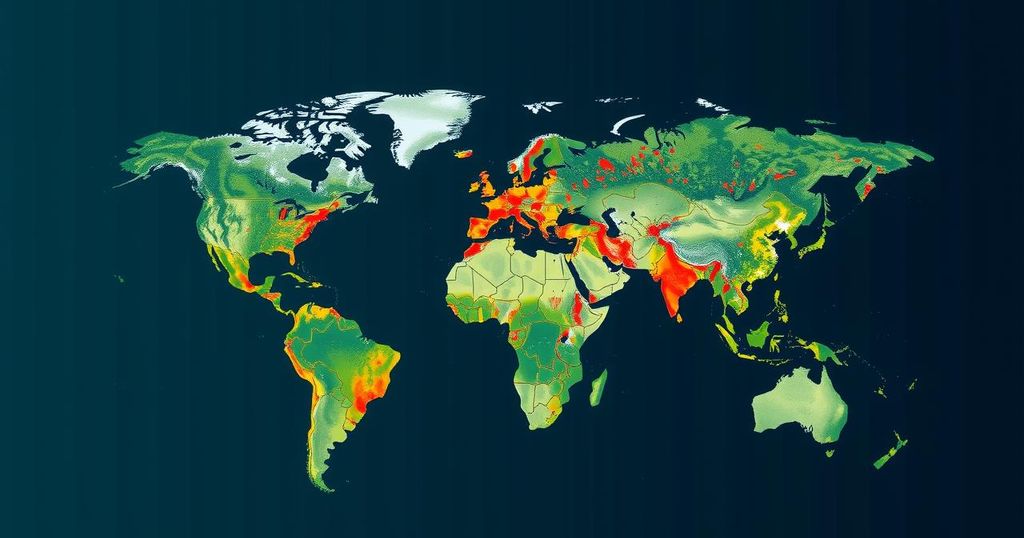Climate change
ASIA, AZERBAIJAN, BAKU, CELESTE SAULO, CLIMATE, CLIMATE CHANGE, ENVIRONMENTAL POLICY, EUROPE, GLOBAL WARMING, GREENHOUSE GAS EMISSIONS, JESSE NEUMANN, PARIS AGREEMENT, SPAIN, UK, UNEP, UNITED NATIONS ENVIRONMENT PROGRAMME, WMO, WORLD METEOROLOGICAL ORGANIZATION, WORLD WEATHER ATTRIBUTION
Fatima Khan
0 Comments
Global Coordination Essential to Combat Climate Change Ahead of COP29
Global organizations have raised alarms regarding the climate crisis, particularly ahead of COP29 in Azerbaijan. Reports indicate record levels of greenhouse gases, urging urgent action. Nations need to strengthen climate targets to avoid severe temperature increases, while China showcases its climate adaptation plan. The COP29 marks a critical point for international collaboration to combat climate change effectively.
Global organizations have reiterated the urgent necessity for concerted action in addressing the ongoing climate crisis, particularly in light of the upcoming 29th Conference of the Parties on Climate Change (COP29) taking place in Baku, Azerbaijan, from November 11-22. Reports from the World Meteorological Organization (WMO) and the United Nations Environment Programme (UNEP) highlight rising greenhouse gas emissions, urging stakeholders to intensify their efforts in combating climate change.
The WMO’s annual Greenhouse Gas Bulletin revealed record levels of greenhouse gases in 2023, indicating a troubling trend. Carbon dioxide concentrations have reached 151 percent, methane 265 percent, and nitrous oxide 125 percent relative to pre-industrial levels, with a staggering increase of 11.4 percent over the last two decades. WMO’s Secretary-General, Celeste Saulo, emphasized the severity of these statistics: “This should set alarm bells ringing among decision-makers. These are more than just statistics. Every part per million and every fraction of a degree temperature increase has a real impact on our lives and our planet.”
The implications of these findings are evident, as a study by the World Weather Attribution identified that the ten most significant meteorological disasters since 2004 have been linked to global warming. For instance, Spain recently experienced a severe flash flood due to heavy rainfall associated with the DANA phenomenon, which serves as a reminder of climate change’s unpredictable and destructive nature, according to Jesse Neumann, a hydrology professor at the University of Reading.
In light of the Paris Agreement, countries are expected to submit updated nationally determined contribution targets by 2025. The UNEP’s 2024 Emissions Gap Report indicates that COP29 presents a critical opportunity for nations to establish robust targets; failure to do so could lead to a temperature increase of 2.6-3.1 degrees Celsius this century, resulting in dire consequences for economies, environments, and communities. UNEP executive director Inger Andersen stated, “I have urged the international community to step up action on climate change and set stronger nationally determined contribution targets to strive to limit temperature rise to 1.5 degrees Celsius.”
China, as the largest developing nation, has laid out its strategy for climate response. During COP29, it introduced an Action Plan on Early Warning for Climate Change Adaptation (2025-2027) acknowledging the heightened risks from extreme weather events. Moreover, China emphasized the need for enhanced global risk assessment capabilities and proposed the establishment of a climate adaptation partnership. Liu Zhenmin, China’s climate envoy, expressed a commitment to controlling methane emissions and advocated for constructive dialogue with the United States to advance global climate cooperation.
As COP29 approaches, Simon Stiell, UN climate chief, asserted the importance of setting an ambitious new climate finance goal, which is vital for ensuring the prosperity of all nations, regardless of their economic status. The impending conference represents a pivotal moment for international collaboration in the fight against climate change, necessitating swift and coordinated action to safeguard the planet for future generations.
The urgency of mitigating climate change has been repeatedly emphasized by global entities, particularly with the upcoming COP29, which serves as a platform for nations to enhance their climate commitments. Climate change has caused observable increases in greenhouse gases and consequential disasters worldwide, necessitating immediate and collective action to avert further damage and ensure a sustainable future. The reports from WMO and UNEP provide critical insights into the current state of greenhouse gas emissions and their implications for global temperature rise, which is of paramount concern for governments and environmental organizations alike.
In conclusion, addressing the climate crisis requires an unprecedented level of global cooperation and commitment. With rising greenhouse gas emissions and the increasing frequency of climate-related disasters, the upcoming COP29 presents an essential opportunity for nations to commit to stringent climate targets. Moving forward, it is imperative for all stakeholders, including the largest economies, to engage in productive dialogue and develop robust strategies for climate adaptation and mitigation, ultimately striving to limit global warming and safeguard the environment for future generations.
Original Source: www.stdaily.com




Post Comment